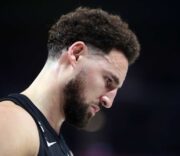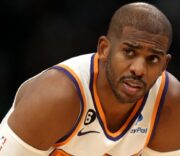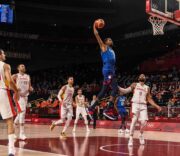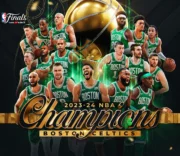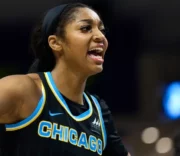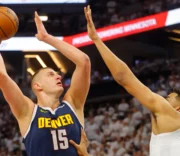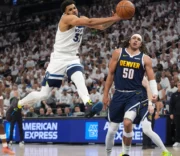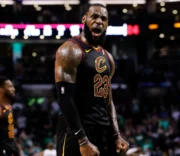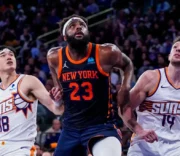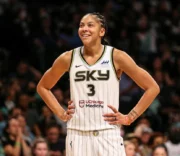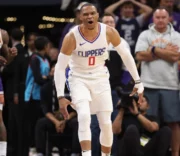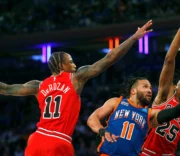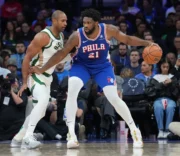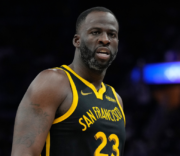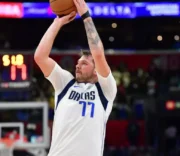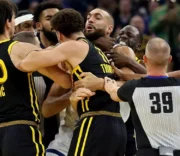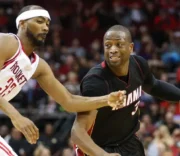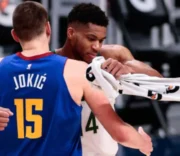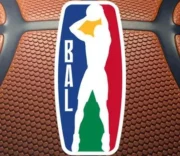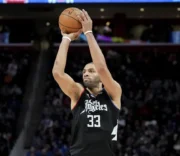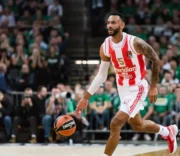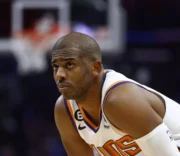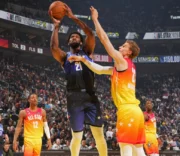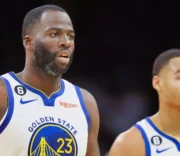
The NBA Board of Governors recently announced two significant rule changes that will be put into effect starting from the 2023-24 NBA season. One of these changes is the introduction of an in-game flopping penalty, aimed at addressing unsportsmanlike behavior on the court. Flopping, a physical act intended to deceive officials into calling a foul on another player, has been a persistent issue in professional basketball, and the league is taking proactive measures to curb its prevalence.
The New Flopping Penalty Explained
Under the newly approved rule, when a game official identifies a flop, the offending player will be charged with a non-unsportsmanlike technical foul. Additionally, the opposing team will be awarded one free throw attempt, which can be taken by any player on the court at the time the technical foul is assessed. The objective here is to create a disincentive for players who engage in this deceptive tactic, promoting fair play and integrity of the game.
Referees will no longer need to halt live play immediately to call a flopping violation. Instead, they can choose to wait for the next neutral opportunity to administer the penalty, allowing for a smoother flow of the game. However, it’s worth noting that officials still have the authority to call both a foul and a flopping violation on the same play, further discouraging such behavior.
Notably, a flopping violation will not be subject to direct review via Coach’s Challenge. Nevertheless, if a Coach’s Challenge or a referee-initiated replay review of certain types of called fouls triggers a flop, it can be called via replay review. The league office will also continue to assess flops after the game, with fines imposed for repeat offenders.
Player and Coach Reactions
Players and coaches have expressed mixed reactions to the new in-game flopping penalty. Some players welcome the change, believing that it will promote fair competition and remove the incentive for deceptive tactics. One anonymous player stated:
“It’s about time the league takes action against flopping. It ruins the integrity of the game, and I’m glad they’re finally addressing it.“
However, not everyone is entirely convinced of its effectiveness. A veteran coach shared his reservations, saying,
“While I understand the intention behind the new rule, I’m not sure it will completely eliminate flopping. Players are always looking for any advantage they can get, and they might still attempt to deceive the officials despite the penalty.“
Expanded Use of Coach’s Challenge to Enhance Game Review Process
The second major rule change approved by the NBA Board of Governors involves the coach’s challenge. The league has expanded its use to allow teams a second challenge if their first challenge is successful. This move aims to further enhance the accuracy of officiating decisions and provide teams with an opportunity to contest critical calls during the game.
The New and Improved Coach’s Challenge
Teams will still be required to use a timeout to trigger a challenge, meaning they must have available timeouts to utilize their challenge privileges. This ensures that teams cannot abuse the challenge system and keeps the process fair and balanced.
However, if a team’s first challenge is successful, they will retain the timeout used to initiate the challenge. This is seen as a fair reward for using the challenge wisely and achieving a favorable outcome. On the other hand, the league has decided not to grant the retention of the timeout used for the second challenge, even if it turns out successful. This decision is based on considerations of game length and flow, as preserving the timeout could potentially disrupt the game’s rhythm.
Coaches and Players Weigh In
The expanded use of the coach’s challenge has garnered mixed reactions from coaches and players alike. Some coaches view it as a positive step forward, as it provides them with more opportunities to rectify crucial officiating errors. One coach remarked:
“Having the option for a second challenge is fantastic. It can be a game-changer in tight situations, and it gives us more confidence in the officiating process.“
However, there are concerns that the challenge system might still have limitations. Players, while acknowledging the need for accurate calls, worry about potential delays and interruptions in the game. A star player said:
“I understand that getting the calls right is essential, but we also need to consider how it impacts the pace of the game. I hope the league finds the right balance.“
Unanimous Recommendations from the NBA’s Competition Committee
Both the in-game flopping penalty and the expanded use of the coach’s challenge were proposed by the NBA’s Competition Committee. This committee consists of players, representatives from the National Basketball Players Association, coaches, governors, team basketball executives, and referees. It unanimously recommended these rule changes to the NBA Board of Governors, highlighting the widespread belief in their potential to improve the game’s integrity and overall experience for players, coaches, and fans alike.
By implementing these rule changes, the NBA is demonstrating its commitment to maintaining the highest level of competition and fairness in the game. Players, coaches, and fans eagerly anticipate the 2023-24 season, eager to witness how these changes will shape the future of professional basketball.
NBA Basketball’s Most Significant Moments
Throughout its illustrious history, NBA Basketball has been witness to unforgettable moments and remarkable players who have left an indelible mark on the sport. From historic games that shaped the league’s narrative to extraordinary players who redefined basketball excellence, the NBA’s legacy is filled with iconic matches and legendary athletes. Let’s delve into some of the most significant moments and players that have made the NBA a beloved global phenomenon.
NBA’s Most Significant Matches:
- 1979 NBA Finals – Magic vs. Bird: The rivalry between Magic Johnson’s Los Angeles Lakers and Larry Bird’s Boston Celtics reached its pinnacle in the 1979 NBA Finals. This classic matchup not only captivated basketball fans but also played a pivotal role in elevating the popularity of the NBA during the 1980s.
- 1992 Olympic “Dream Team” Dominance: The 1992 United States men’s Olympic basketball team, famously known as the “Dream Team,” featured basketball’s biggest stars, including Michael Jordan, Magic Johnson, and Larry Bird. Their extraordinary display of talent and teamwork led to an unparalleled dominance, winning the gold medal and solidifying the NBA’s global appeal.
- 1993 NBA Finals – Chicago Bulls’ Three-Peat: Led by the iconic Michael Jordan, the Chicago Bulls secured their third consecutive NBA championship in 1993, capping off an impressive three-peat. This achievement further solidified Jordan’s status as one of the greatest players in NBA history.
- 2008 NBA Finals – Boston Celtics’ Revival: The Boston Celtics’ victory over the Los Angeles Lakers in the 2008 NBA Finals marked a significant moment for the franchise, ending a 22-year championship drought. Kevin Garnett, Paul Pierce, and Ray Allen formed the “Big Three,” rejuvenating the Celtics’ legacy.
- 2016 NBA Finals – Cavaliers’ Historic Comeback: In a historic showdown, LeBron James led the Cleveland Cavaliers to a remarkable comeback victory against the Golden State Warriors in the 2016 NBA Finals. The Cavaliers overcame a 3-1 series deficit, earning their first NBA championship in franchise history.
Legendary NBA Players:
- Michael Jordan: Often regarded as the greatest basketball player of all time, Michael Jordan’s impact on the NBA and global basketball culture is unparalleled. His six NBA championships, scoring titles, and competitive spirit solidified his status as a basketball legend.
- Kobe Bryant: Known as the “Black Mamba,” Kobe Bryant’s illustrious career with the Los Angeles Lakers saw him win five NBA championships and become one of the most beloved and respected players in the league’s history.
- LeBron James: LeBron James has redefined basketball excellence in the modern era. His versatility, leadership, and four NBA championships have cemented his place as one of the most influential players of his generation.
- Shaquille O’Neal: The dominant force in the paint, Shaquille O’Neal’s imposing presence and three NBA championships with the Los Angeles Lakers and one with the Miami Heat made him an icon of basketball’s big man era.
- Larry Bird: Larry Bird’s incredible skills as a shooter and passer, along with his intense rivalry with Magic Johnson, helped propel the NBA to new heights during the 1980s.
From unforgettable matches that changed the course of NBA history to legendary players who continue to inspire future generations, the NBA’s rich tapestry is woven with moments of greatness and triumph. As the league marches forward, fans eagerly anticipate the next chapter of basketball brilliance and the rise of new iconic players destined to etch their names in the annals of NBA lore.
Key Significant Rule Changes in NBA Basketball
The NBA has been continuously evolving its rulebook to ensure fairness, competitiveness, and entertainment for players and fans alike. Below are some of the most significant rule changes that took place before the 2023 season:
| Rule Changes | Description |
| Introduction of the Shot Clock | In 1954, the NBA introduced the shot clock, revolutionizing the game’s pace. It required teams to attempt a shot within 24 seconds, preventing stalling tactics and promoting fast-paced, high-scoring basketball. |
| Three-Point Line Implementation | In the 1979-80 season, the NBA introduced the three-point line. Shots made beyond this arc were awarded three points, encouraging long-range shooting strategies and adding a new dimension to offensive play. |
| Hand-checking Restrictions | To increase scoring and enhance offensive play, the NBA implemented hand-checking restrictions in the 2004-05 season. Defenders were prohibited from using excessive contact with their hands to impede offensive players. |
| Clear Path Foul Rule | In the 2006-07 season, the NBA introduced the clear path foul rule to prevent intentional fouls on a player with an open path to the basket. The fouled player is awarded two free throws and possession of the ball. |
| Video Replay Review Expansion | Over the years, the NBA expanded the use of video replay review to include various scenarios, such as reviewing buzzer-beaters, shot clock violations, and determining flagrant fouls. This aimed to ensure accurate officiating decisions during critical moments of the game. |
| Defensive 3-Second Rule | In the 2001-02 season, the NBA introduced the defensive three-second rule, which limits the time a defensive player can spend in the paint without guarding an opponent. This rule promotes offensive spacing and ball movement. |
Evolution of the NBA Game
These key rule changes have significantly influenced the style of play in the NBA. The introduction of the shot clock and the three-point line revolutionized offensive strategies, encouraging faster-paced games and rewarding sharpshooters from beyond the arc. Hand-checking restrictions and the clear path foul rule aimed to create a more fluid and free-flowing game, promoting offensive creativity and reducing overly physical play.
With the expansion of video replay review, the NBA embraced technology to ensure fairness and accuracy in officiating, thus providing players and fans with greater confidence in the game’s integrity. Additionally, the defensive three-second rule fostered more dynamic defensive strategies, encouraging players to adapt to evolving defensive schemes.
As the NBA continues to grow and evolve, these significant rule changes from before 2023 have left a lasting legacy on the game, shaping it into the thrilling and captivating sport we know and love today.
Conclusion: Looking Ahead with Optimism
The NBA’s decision to introduce an in-game flopping penalty and expand the coach’s challenge for the 2023-24 season marks a transformative period in professional basketball. These rule changes have been unanimously recommended by the NBA’s Competition Committee, reflecting the collective belief in their ability to enhance fairness, integrity, and competition on the court.
As the new season unfolds, players, coaches, and fans will witness the practical implications of these rule changes. While initial reactions may vary, the NBA’s commitment to upholding the highest standards in the sport will undoubtedly guide its future decisions. With a strong emphasis on continuous improvement and progress, the league remains dedicated to creating a basketball experience that captivates and inspires audiences worldwide. As the saying goes, “Change is the only constant,” and in this ever-evolving landscape, the NBA embraces change with optimism and a commitment to the game’s enduring spirit.




